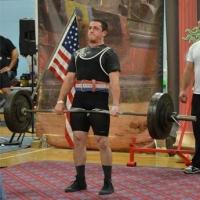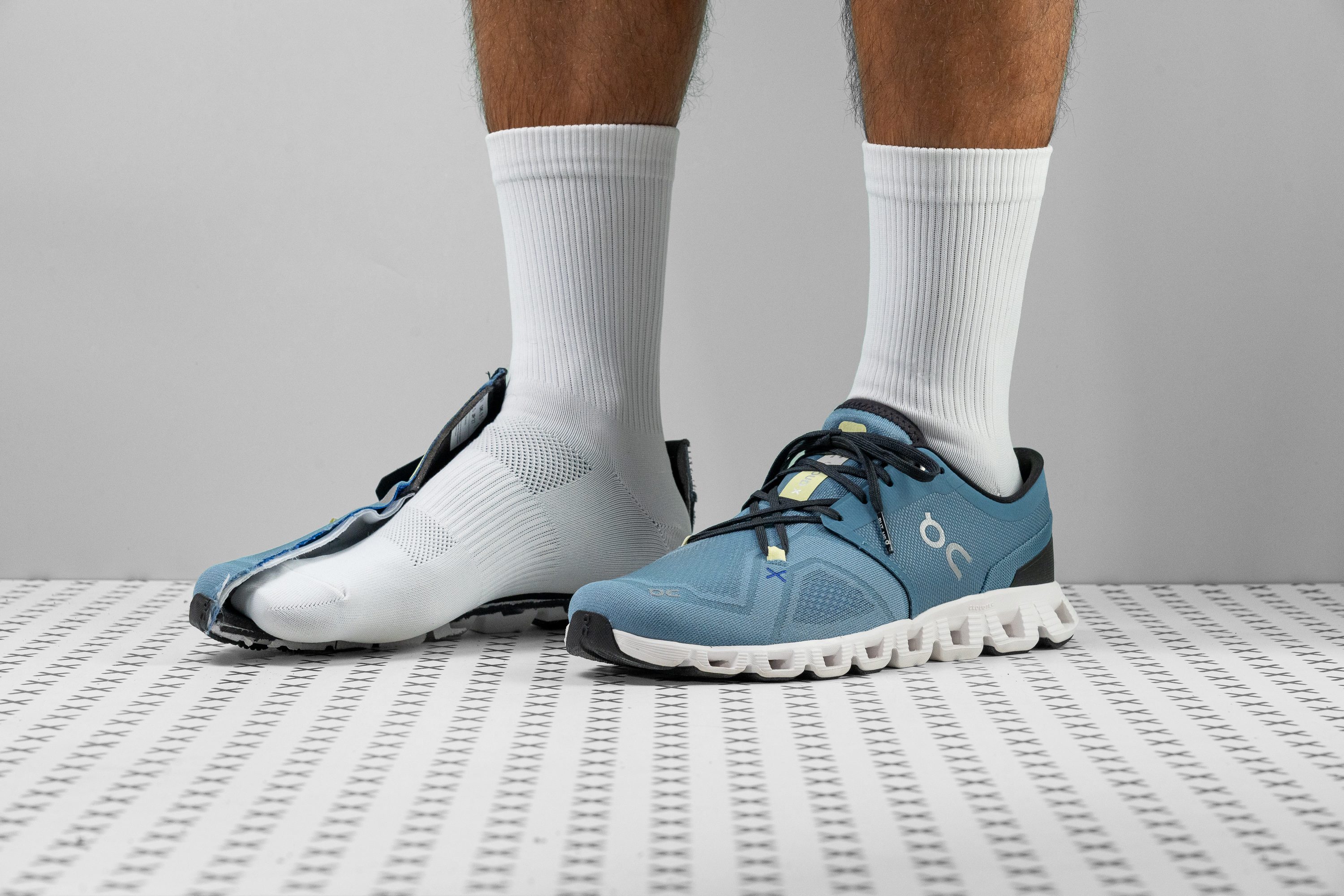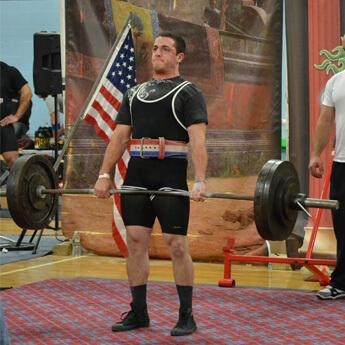Our verdict
Pros
- Very lightweight
- Highly breathable
- Excellent ground feel
- Stable platform
- Flexible forefoot
- Secure lockdown
- Sustainable materials
Cons
- No upper durability
- Unreasonable price
Audience verdict
- Top 28% most popular training shoes
Comparison
The most similar training shoes compared
+ + Add a shoe | |||||
|---|---|---|---|---|---|
| Audience score | 87 Great! | 89 Great! | 84 Good! | 82 Good! | |
| Price | $150 | $150 | $150 | $150 | |
| Use | WorkoutCross-trainingGymHIITJumping ropeAll sports | WorkoutCross-trainingGymHIITJumping rope | WorkoutCross-trainingGymHIITJumping rope | CrossfitWorkoutCross-trainingGymHIITJumping rope | |
| Shock absorption | - | High | High | Low | |
| Energy return | - | Moderate | High | High | |
| Traction | - | Low | Moderate | Moderate | |
| Drop lab | 9.2 mm | 8.9 mm | 8.5 mm | 7.7 mm | |
| Heel stack lab | 25.5 mm | 30.4 mm | 23.2 mm | 22.9 mm | |
| Forefoot | 16.3 mm | 21.5 mm | 14.7 mm | 15.2 mm | |
| Weight lab | 8.7 oz / 248g | 9.5 oz / 268g | 8.7 oz / 247g | 12.1 oz / 342g | |
| Lightweight | ✓ | ✓ | ✓ | ✗ | |
| Breathability | Breathable | Breathable | Breathable | Breathable | |
| Width / fit | Narrow | Medium | Medium | Medium | |
| Toebox width | Medium | Medium | Medium | Medium | |
| Size | True to size | Slightly small | Slightly small | True to size | |
| Midsole softness | Firm | Balanced | Firm | Balanced | |
| Stiffness | Stiff | Stiff | Moderate | Moderate | |
| Torsional rigidity | Moderate | Flexible | Flexible | Flexible | |
| Heel counter stiffness | Moderate | Moderate | Flexible | Moderate | |
| Toebox durability | Bad | Decent | Decent | Bad | |
| Heel padding durability | Bad | Bad | Decent | Decent | |
| Outsole durability | Decent | Bad | Good | - | |
| Midsole width - forefoot | Average | Average | Average | Average | |
| Midsole width - heel | Wide | Average | Wide | Average | |
| Widths available | NarrowNormal | Normal | Normal | Normal | |
| Insole thickness | Thick | Average | Average | ||
| Outsole thickness | Average | Average | Average | Thick | |
| Outsole hardness | Average | Average | Average | Average | |
| Heel tab | None | None | None | None | |
| Tongue: gusset type | Both sides (full) | Both sides (semi) | Both sides (semi) | Both sides (full) | |
| Tongue padding | Average | Average | Very thin | Very thin | |
| Ranking | #25 Top 47% | #12 Top 33% | #25 Bottom 32% | #29 Bottom 21% | |
| Popularity | #15 Top 28% | #4 Top 11% | #29 Bottom 21% | #21 Bottom 43% |
Who should buy
In our opinion, the Cloud X 3 would be of great interest to those who:
- want a slick and stylish gym shoe that looks more like a sneaker
- need a lightweight trainer (the Cloud X 3 is among the lightest in our catalog)
- prefer firm platforms that are close to the ground
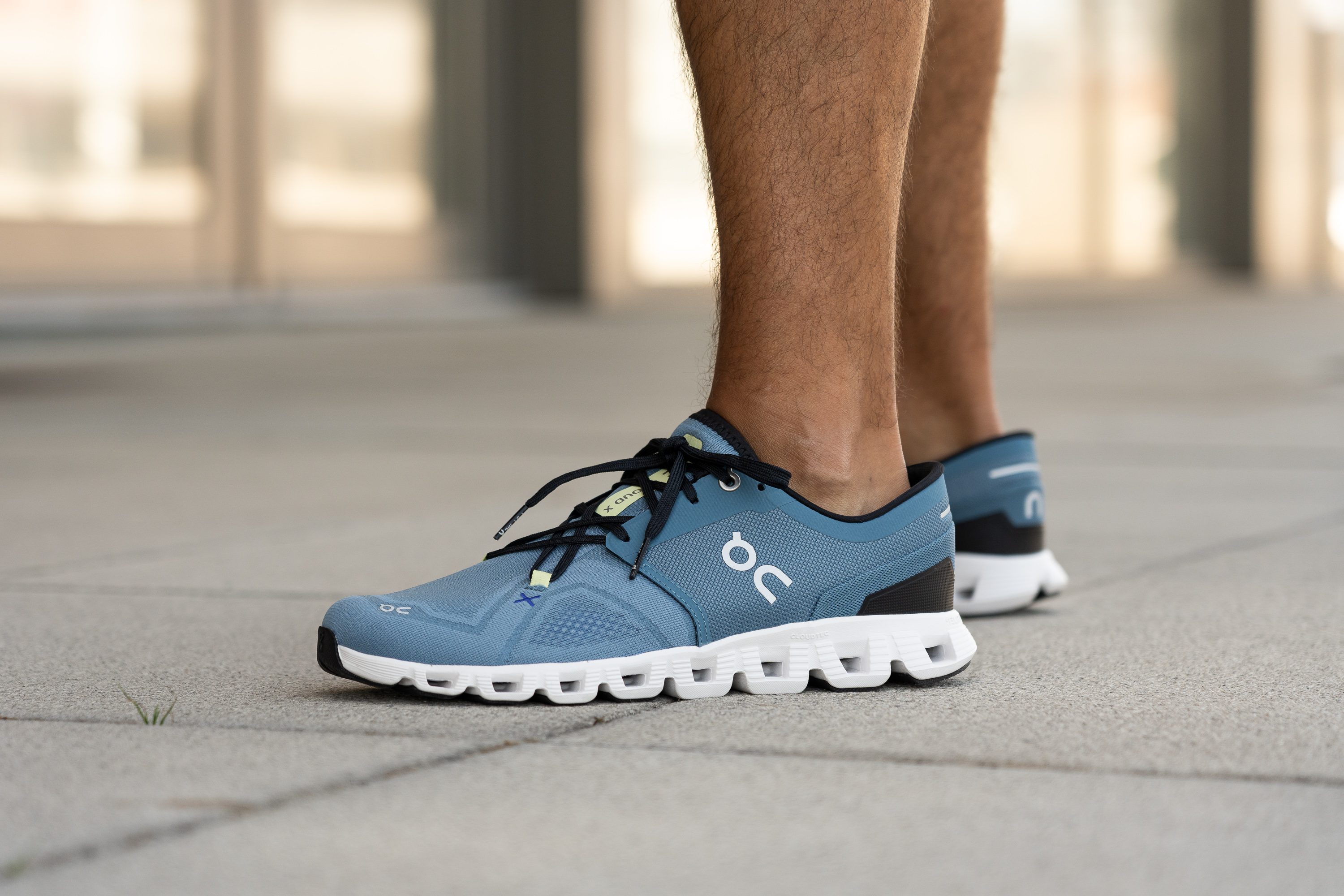
Who should NOT buy
One major problem with the On Cloud X 3 is its sky-high price. At $150, it is significantly more expensive than training shoes on average ($105).
Heck, it is even more expensive than the flagship Crossfit shoes like the Nike Metcon 8 and the Reebok Nano X3 which are way more durable and tech-packed.
Another big concern is the shoe's durability. Based on our lab tests, the wear resistance of the Cloud X 3 is much lower than its premium price. If you go hard at the gym and include rope climbs into the routine, go with any of the aforementioned Nike or Reebok shoes instead. The NOBULL Outwork is another bulletproof option.
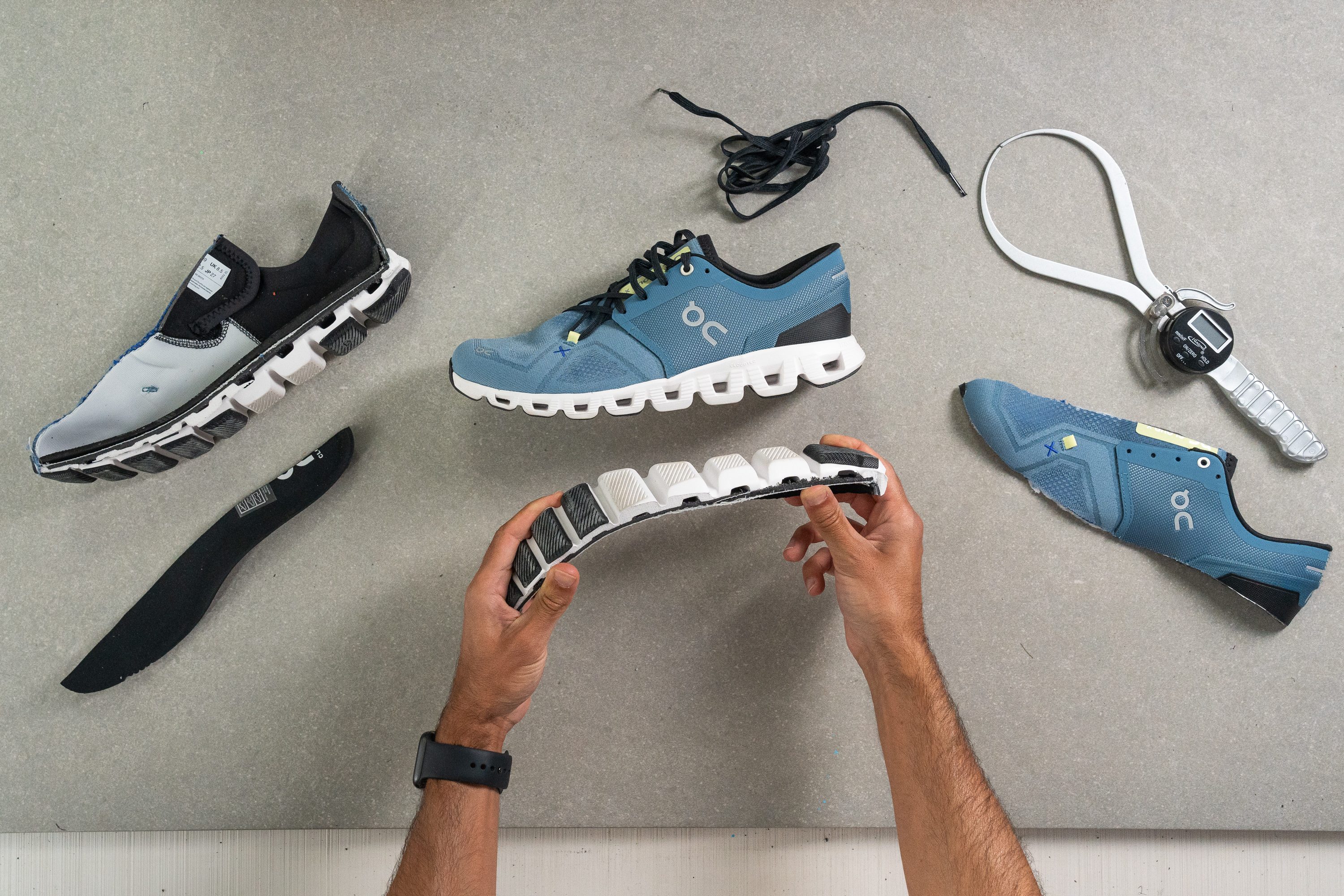
Cushioning
Heel stack
The brand refers to the shoe's cushioning as "low," implying that it is not max-cushioned and is low to the ground.
Using a caliper, we measured its heel stack height at 25.5 mm. This is considered low for a running shoe but is just average for a cross-trainer. You do need less cushioning underfoot to feel stable and in control of the movement.
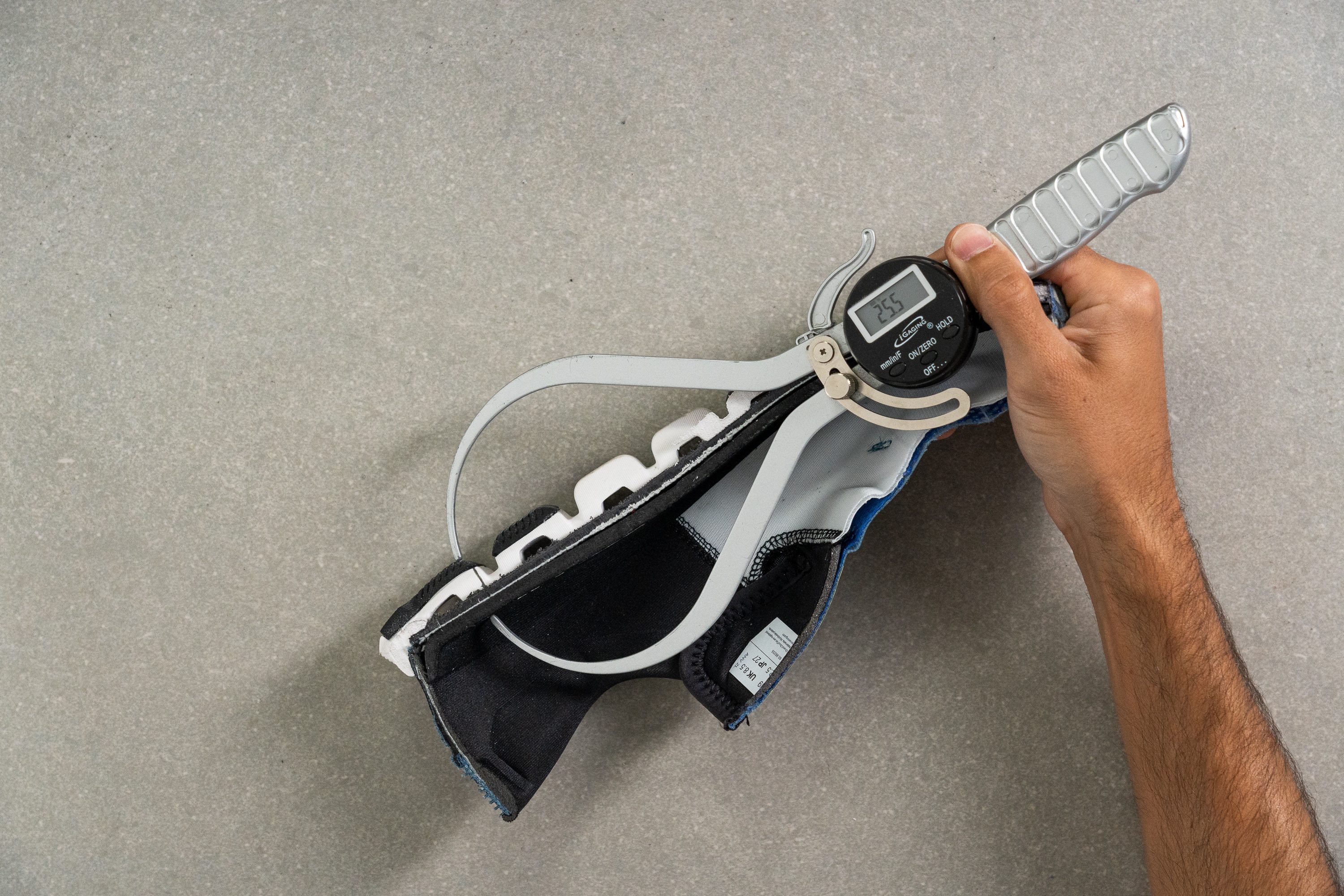
| Cloud X 3 | 25.5 mm |
| Average | 24.3 mm |
Forefoot stack
In the forefoot, our caliper shows 16.3 mm of stack height. This is about 2 mm lower than the average.
Keeping the toes so low to the ground, the Cloud X 3 felt quite steerable, quickly adjusting to changes in the foot position.
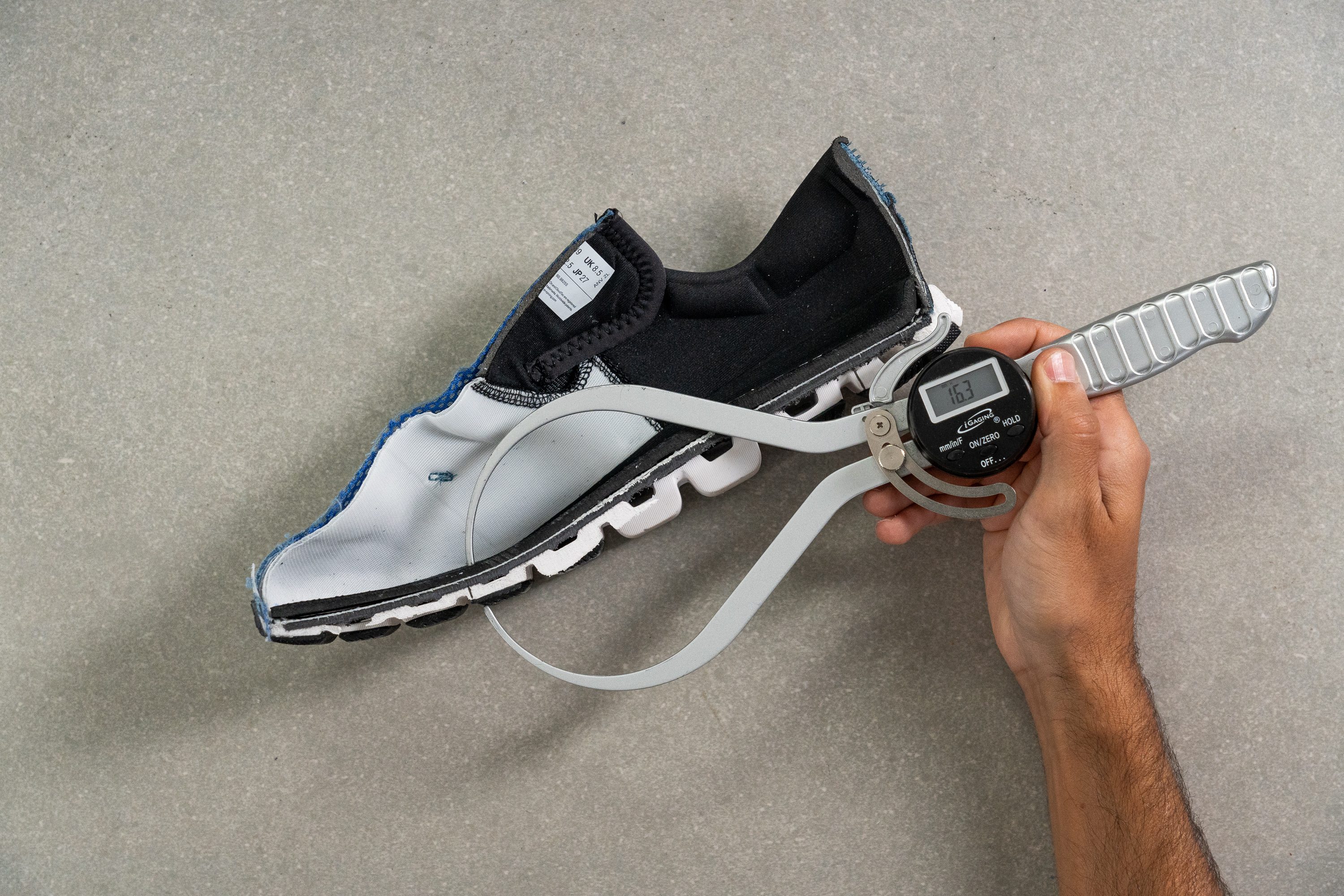
| Cloud X 3 | 16.3 mm |
| Average | 18.1 mm |
Drop
Calculating the difference between the heel and the forefoot of the Cloud X 3, we found that the shoe's drop is 9.2 mm. This is 1.2 mm taller than the officially stated 8 mm but is not critical.
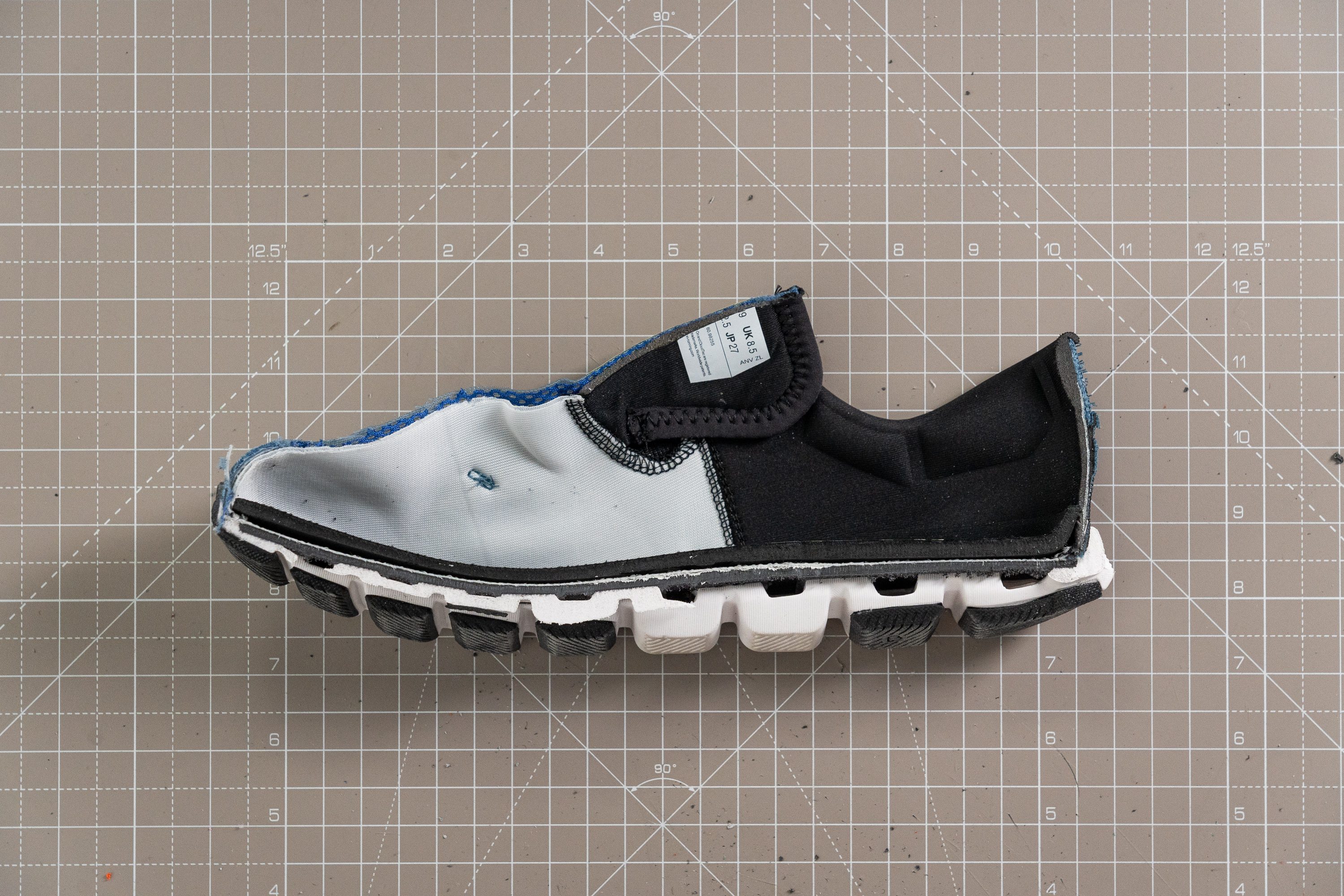
This is quite tall for a training shoe as the typical drop ranges from 4 to 6 mm. Even road running shoes these days have an average drop of 8.7 mm.
But given that the Cloud X 3 is not a tall shoe to begin with, we didn't feel like the heel was elevated that much. And yet, having a higher drop felt beneficial to us when walking or when heel striking during runs.
| Cloud X 3 | 9.2 mm |
| Average | 6.3 mm |
Midsole softness
The On Cloud X 3 feels pretty dang firm (like most On Clouds, actually).
Pressing a durometer against the foam, we got a reading of 32.8 HA, which is 21% firmer than our lab-tested average.
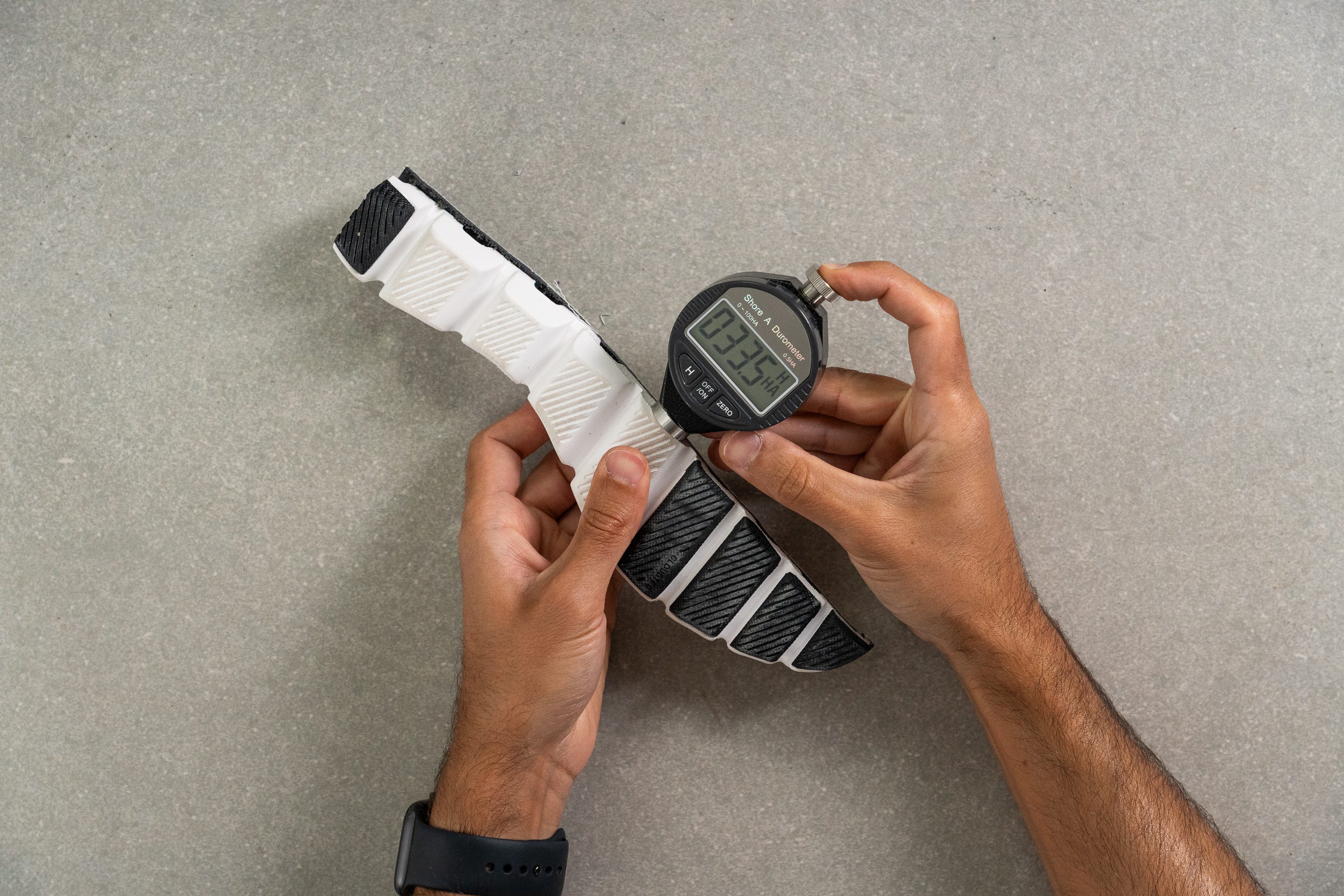
This is actually perfect for most exercises in the gym but is less than ideal for running. We recommend keeping the runs short (less than 5 miles) in the Cloud X 3 unless you are used to a firmer ride.
And if you want softer cushioning for runs and jumps, we suggest the Nike Free Metcon 5.
| Cloud X 3 | 32.8 HA |
| Average | 27.8 HA |
Size and fit
Size
On Cloud X 3 fits true to size (299 votes).
Internal length
| Cloud X 3 | 267.7 mm |
| Average | 268.9 mm |
Width / Fit
With the On brand being notorious for its narrow-fitting shoes, we were especially meticulous about this measurement.
First, we measured the widest part of the toebox. Seeing 100.1 mm on the caliper was very reassuring. This is exactly the average of our lab-tested training shoes.
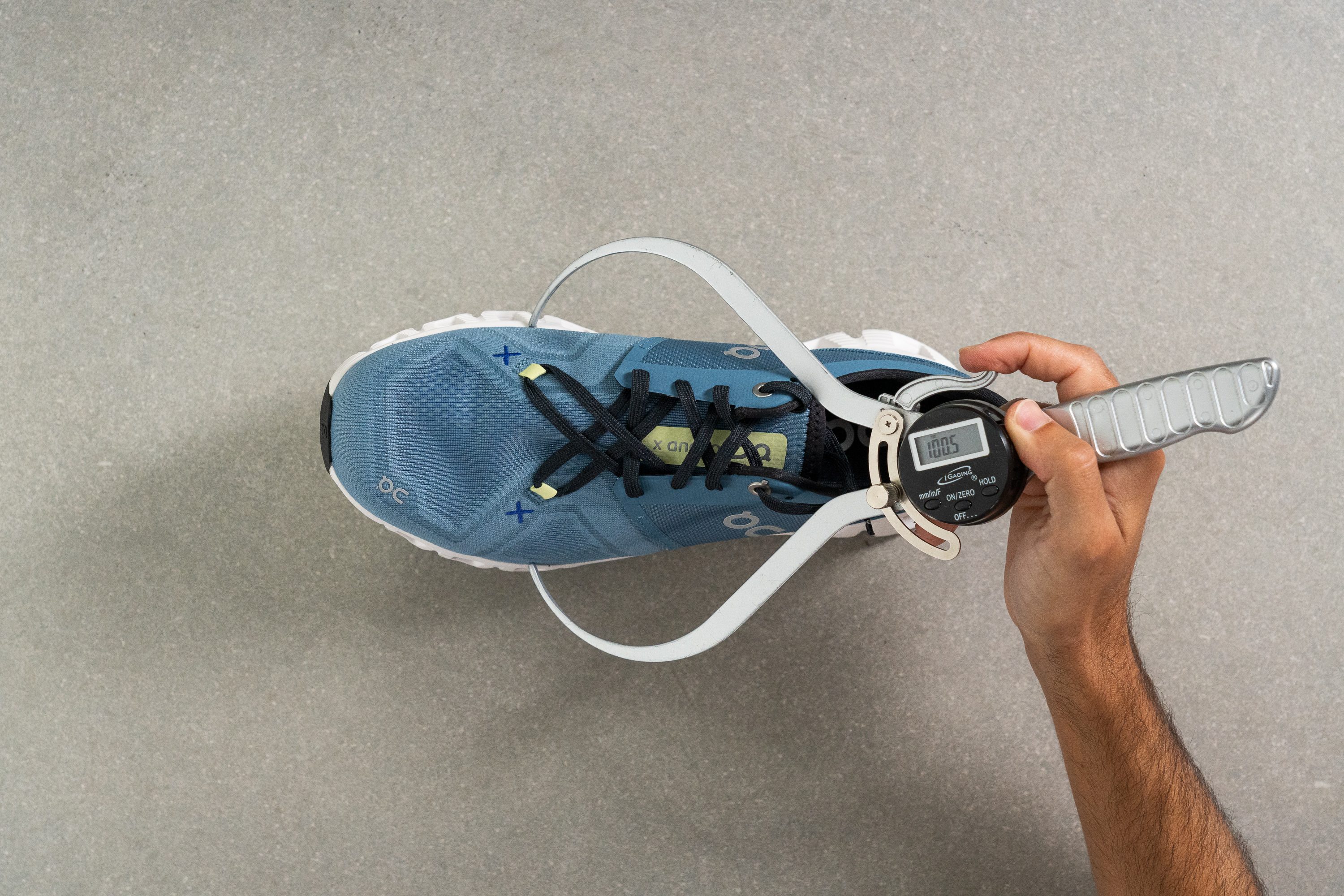
This test follows an older methodology, which is why you don't see recently tested shoes in the chart. Results from different methodologies can not be compared.
| Cloud X 3 | 100.1 mm |
| Average | 100.6 mm |
Toebox width
The shoe doesn't get too narrow around the toes either. Measuring the width near the big toe at 78.5 mm, it is no different than the average.
Thus, we can confirm the brand's statement that the On Cloud X 3 fits true to size.
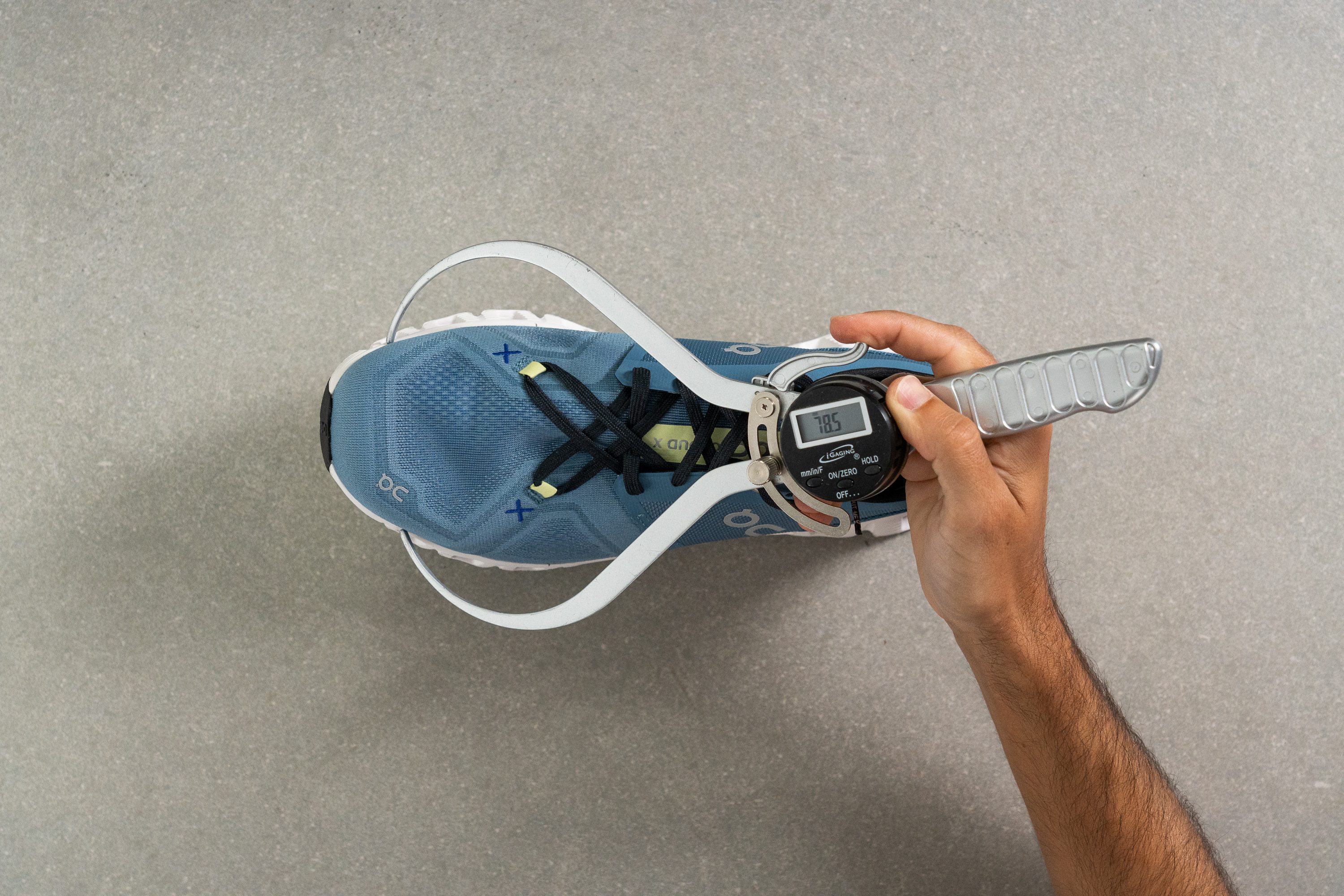
This test follows an older methodology, which is why you don't see recently tested shoes in the chart. Results from different methodologies can not be compared.
| Cloud X 3 | 78.5 mm |
| Average | 78.8 mm |
Flexibility / Stiffness
With its low forefoot stack and separate pods, the On Cloud X 3 is very easy to bend.
It only required a force of 16.5N for us to bend the shoe to a 90-degree angle. Compared to other training shoes, this makes the Cloud 36% more flexible than average!
Having such a flexible forefoot in a gym shoe is essential for comfortable lunges and planks, among other exercises where you have to bend the foot a lot.
This test follows an older methodology, which is why you don't see recently tested shoes in the chart. Results from different methodologies can not be compared.
| Cloud X 3 | 16.5N |
| Average | 17.7N |
Weight
According to the brand, the On Cloud X 3 comes in at 8.6 oz (243g) per shoe.
We found it to be true, having weighed the shoe ourselves in a men's US size 9. The scale showed us just a couple of grams heavier - 8.7 oz (248g).
This is incredibly light for a training shoe! Very few shoes on our list (minimalist excluded) can compete with that weight. We definitely felt very agile and maneuverable in this On Cloud trainer. It is barely felt on the foot!
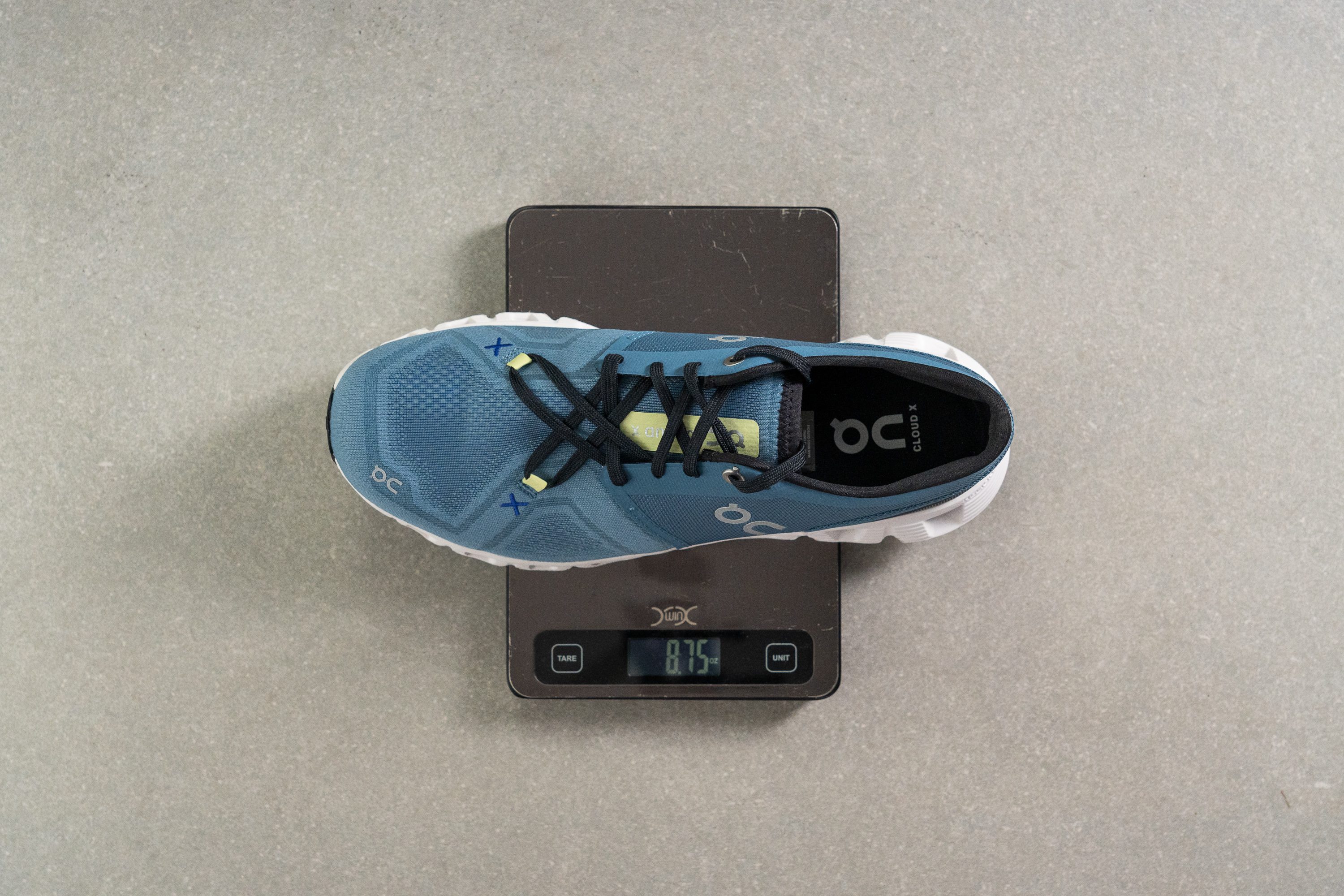
| Cloud X 3 | 8.7 oz (248g) |
| Average | 10.7 oz (304g) |
Breathability
If your training venue is hotter than the jungle, the Cloud X 3 is there to help.
Despite its three-layer mesh, we found that the shoe keeps the interiors very well-ventilated. Pumping smoke through the upper, we were happy to see a lot of it coming out on the other side.
Thus, the Cloud X 3 deserves a rating of 4 out of 5 for breathability.
Putting the shoe against a bright light, we could see which parts of the upper are most responsible for the ventilation. As you can see, the toebox mesh is very transparent.
Taking a closer look at the mesh through our microscope, we were able to see the shoe's breathability secret.
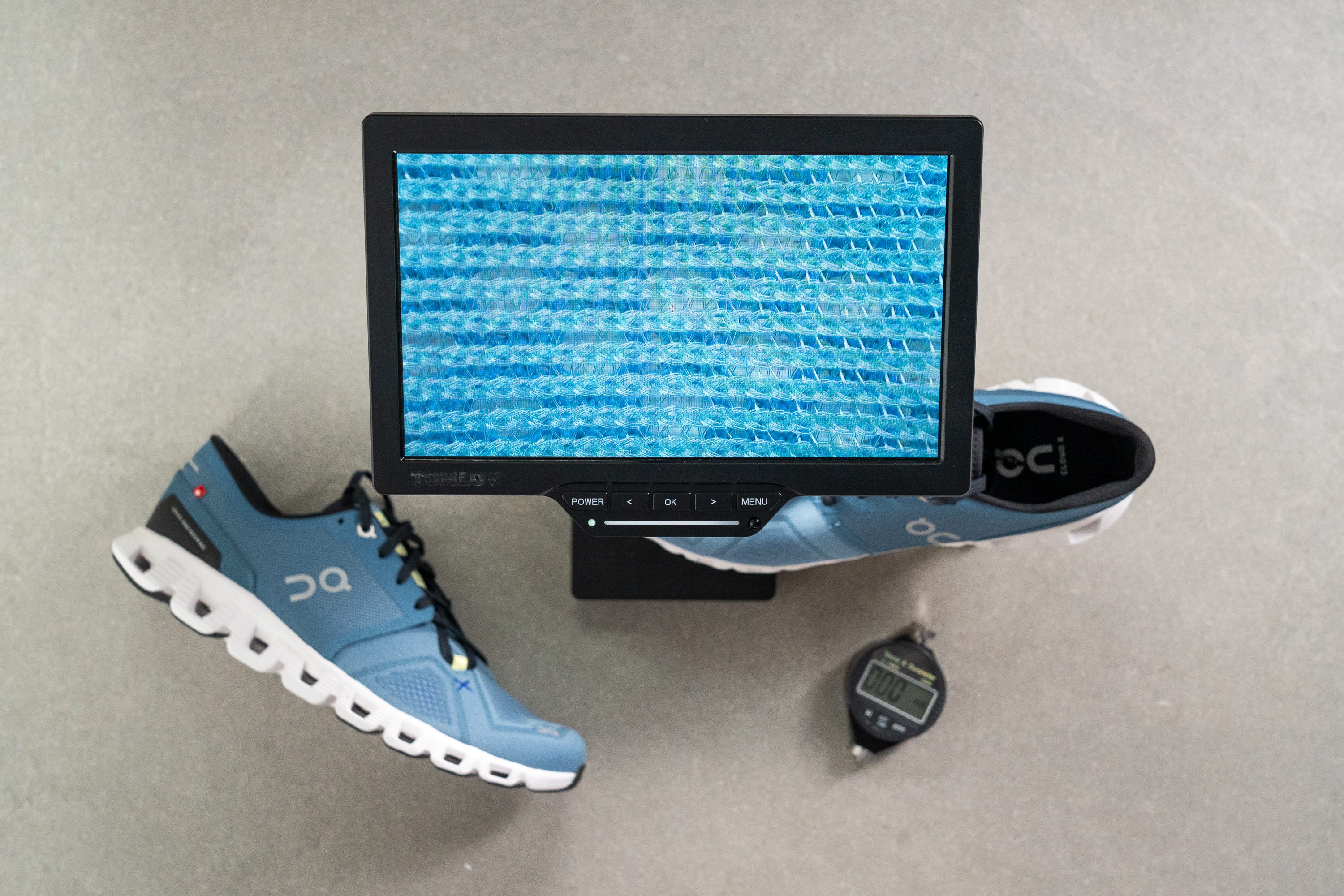
The middle mesh layer is made of really large ventilation pores, while the topmost layer has really thin threads.
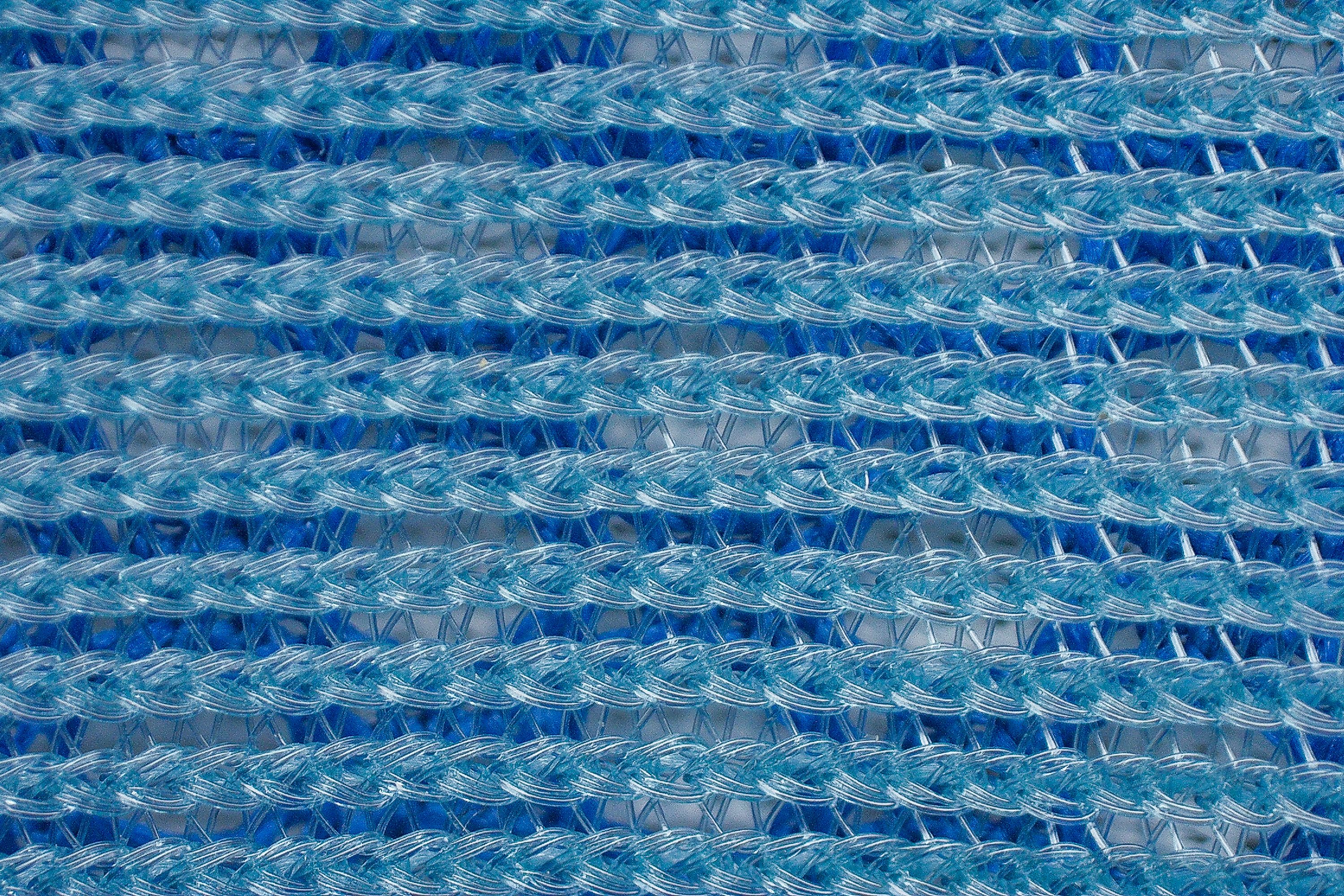
| Cloud X 3 | 4 |
| Average | 3.6 |
Stability
Lateral stability test
As soon as we put the Cloud X 3 on, we knew that stability is the shoe's forte.
Grounded, firm, and wide, it did a great job preventing the ankle from excessive rolling.
Torsional rigidity
The Cloud X 3 comes with a plastic Speedboard plate in its midsole, which adds the stiffness necessary for side-to-side stability.
Twisting the shoe in our hands, we assessed its torsional rigidity as 3 out of 5, where 5 is the stiffest.
| Cloud X 3 | 3 |
| Average | 2.9 |
Heel counter stiffness
We also made sure that the heel counter has a decent stiffness to it. Having enough firmness in this area is essential for ankle support.
Based on our manual test of squeezing and pushing the collar, we rated this parameter as 3 out of 5.
This is just enough for most people but not so much for overpronators. We recommend these folks consider the Reebok Nano X3 as it has a stiffer and more padded heel collar.
| Cloud X 3 | 3 |
| Average | 2.7 |
Midsole width - forefoot
The brand really made sure to provide the Cloud X 3 with a wide and stable base.
Measuring the widest part of the sole in the forefoot, we found it to be 112.2 mm, which is a few millimeters wider than average. Impressive!
It really helped us feel planted for strength training, both bodyweight and with a moderate load. Having a wide landing surface also helped during box jumps.
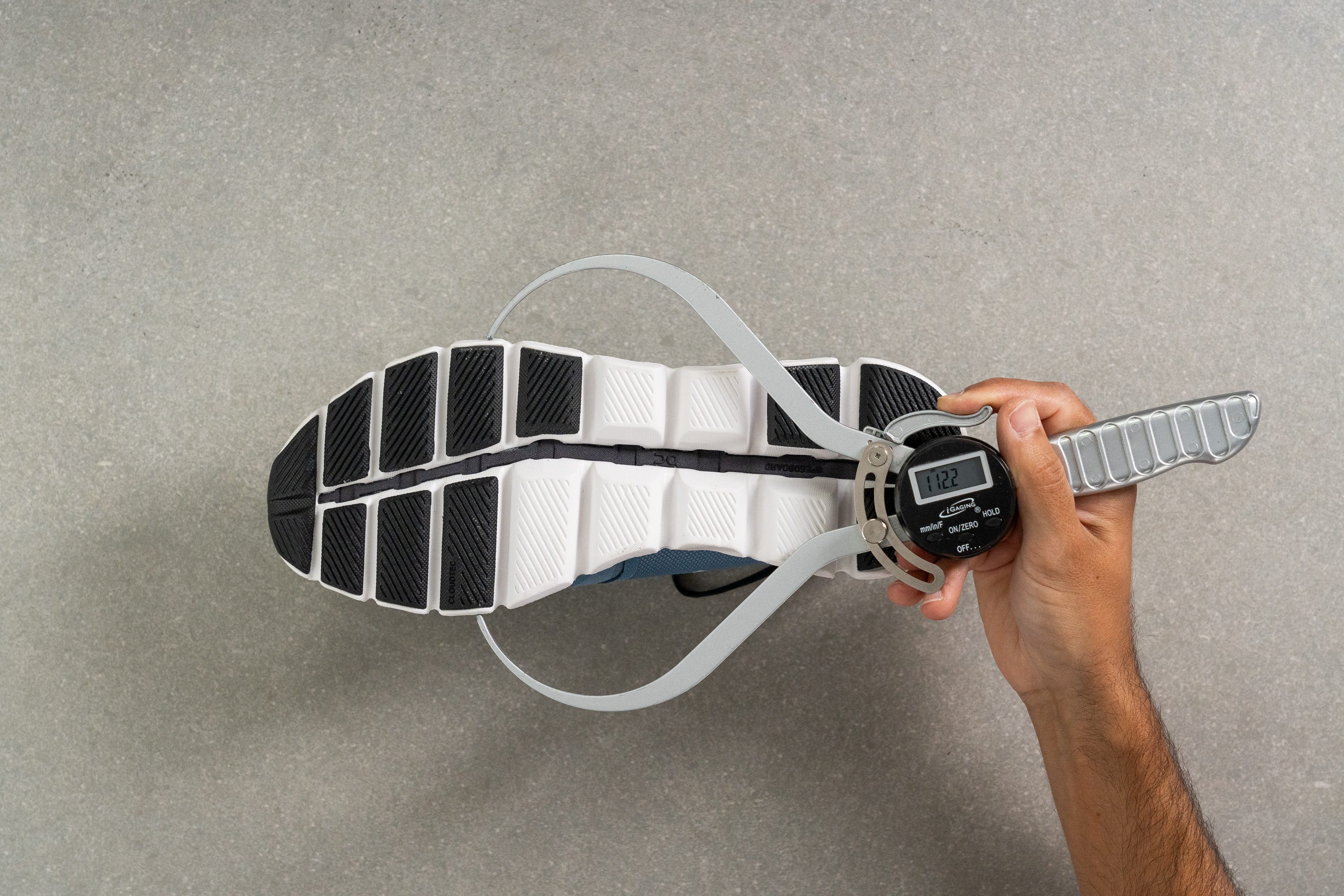
| Cloud X 3 | 112.2 mm |
| Average | 110.9 mm |
Midsole width - heel
The sole remains wide in the heel too. In the widest part, we found it to be 91.4 mm which is more than 4 mm wider than average!
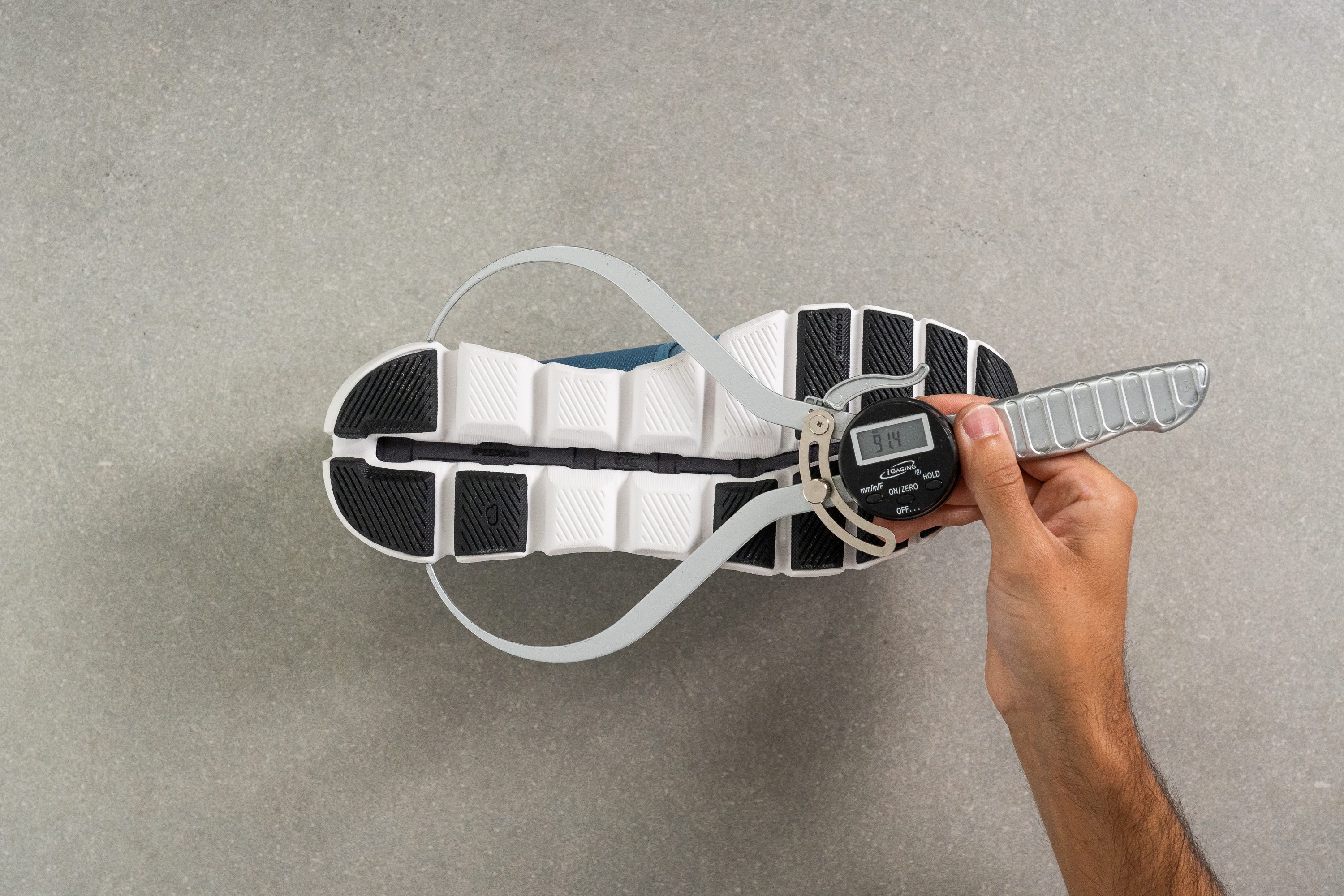
| Cloud X 3 | 91.4 mm |
| Average | 86.9 mm |
Durability
Toebox durability
Unfortunately, having multiple layers of mesh didn't make the On Cloud X 3 more durable.
It was a huge disappointment to see how a $150 trainer got destroyed the moment our Dremel touched it. This made us rate the shoe's toebox durability as low as 1 out of 5.
Why not add at least one protective overlay?
This is truly shocking because the Nike Metcon 8 ($130) was barely scratched after the same durability test. And we applied the same force (3.2N) and speed (10K RPM) in both cases.
| Cloud X 3 | 1 |
| Average | 2.7 |
Heel padding durability
The same happened to the shoe's heel padding. A very brief four-second encounter with our Dremel left this area completely torn. We also gave it a rating of 1 out of 5 (the lowest possible).
Of course, very few training shoes get away with a scratch after the Dremel test but we expected more from a shoe at such a high price point.
| Cloud X 3 | 1 |
| Average | 2.9 |
Outsole hardness
The outsole seems to be doing better than the upper but still falls behind most gym shoes on our list.
Pressing a durometer against the rubber pods at the bottom gave us a reading of 82.8 HC. It is a little softer than average but not critically. We associate softer rubbers with faster abrasion.
However, if you plan to work out a lot outdoors, this is definitely not a great option. If you expect a long life from the Cloud X 3, limit its use to gym floors and rubber mats.
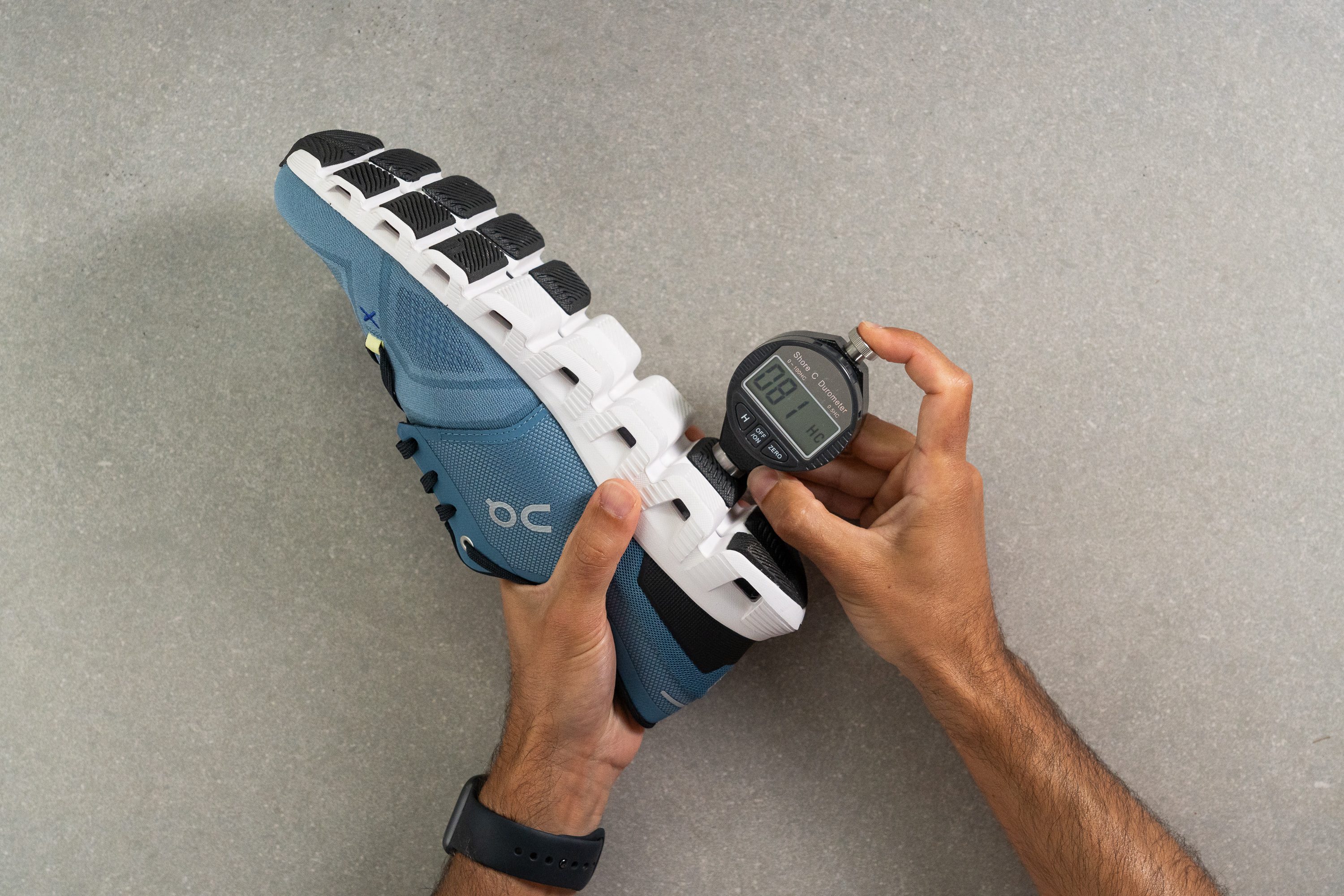
| Cloud X 3 | 82.8 HC |
| Average | 83.2 HC |
Outsole durability
Applying our Dremel to the same rubber compound, we found that it left a little deeper dent compared to the average.
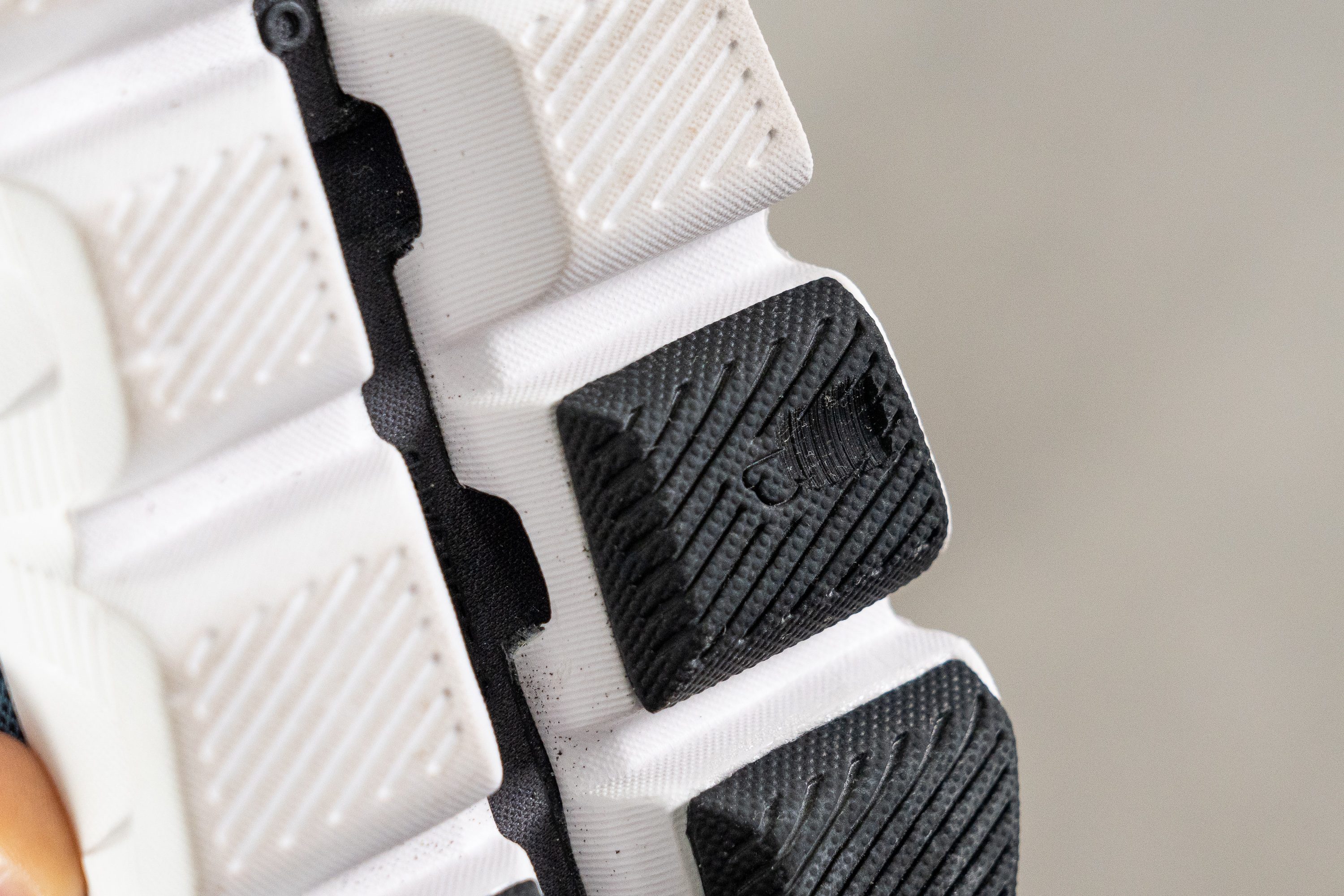
We used a tread gauge to measure the depth of the damage and it returned 1.15 mm. A little more than the average 1 mm. We believe that this is due to the slightly softer nature of this On shoe's rubber.
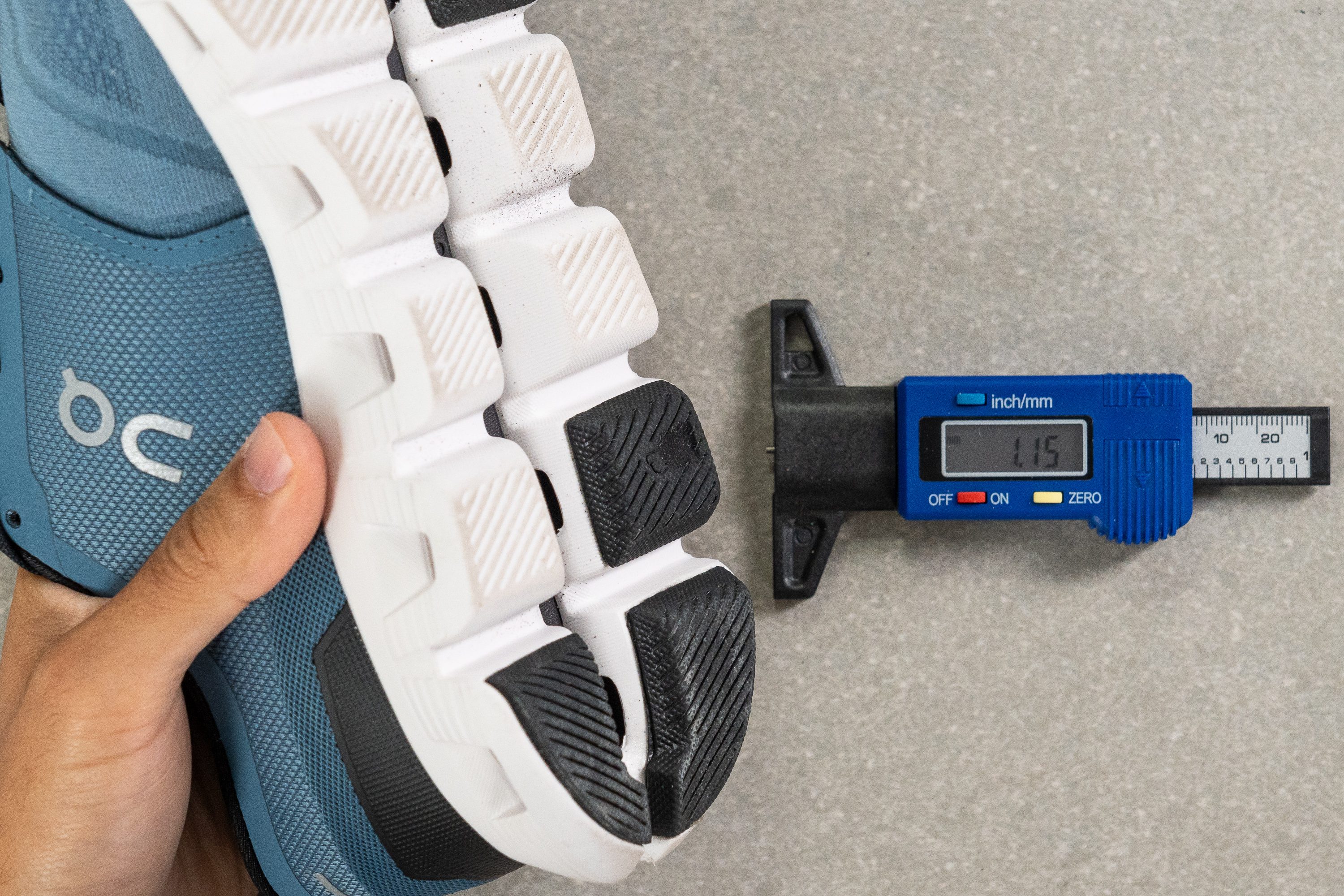
| Cloud X 3 | 1.1 mm |
| Average | 1.1 mm |
Outsole thickness
Finally, we measured the thickness of the rubber compound with a caliper. It turned out to be 3 mm on the On Cloud X 3 and is also thinner than the average 4 mm.
Given that the outsole is thinner, softer, and more prone to abrasion than the rest of our lab-tested trainers, we don't think that the outsole will last very long. The fact that it is not a full-length layer and is made up of separate pods doesn't help the situation.
All things considered, we are very much disappointed in the shoe's durability at this price point.
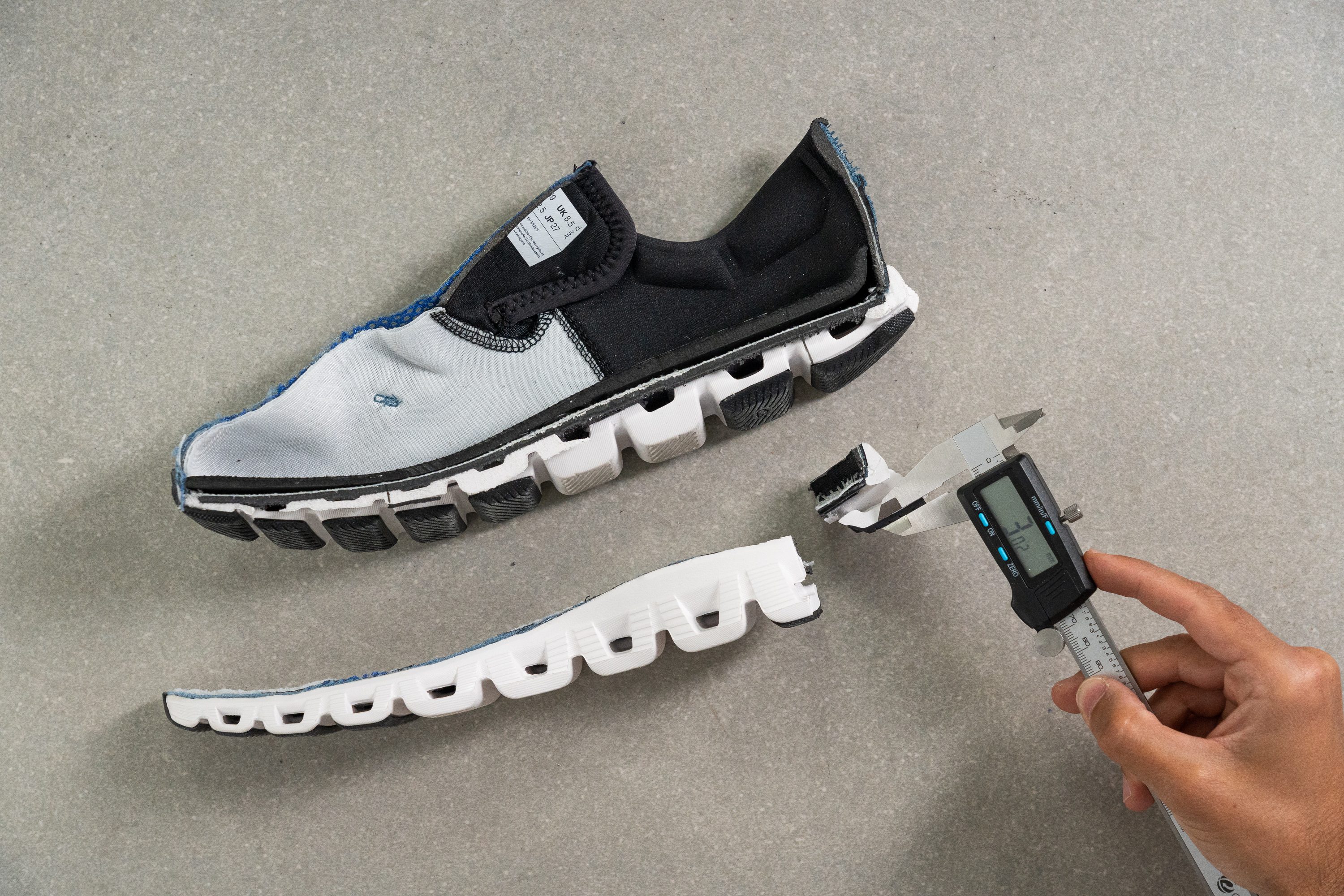
| Cloud X 3 | 3.0 mm |
| Average | 3.6 mm |
Misc
Insole thickness
Those willing to feel even more grounded in the On Cloud X 3 can actually take out the insole and enjoy the difference.
We found that the insole in this shoe is much more padded than the average. At 5.7 mm, it is nearly 2 mm thicker than most trainers.
However, we didn't feel like it was a problem when working out.
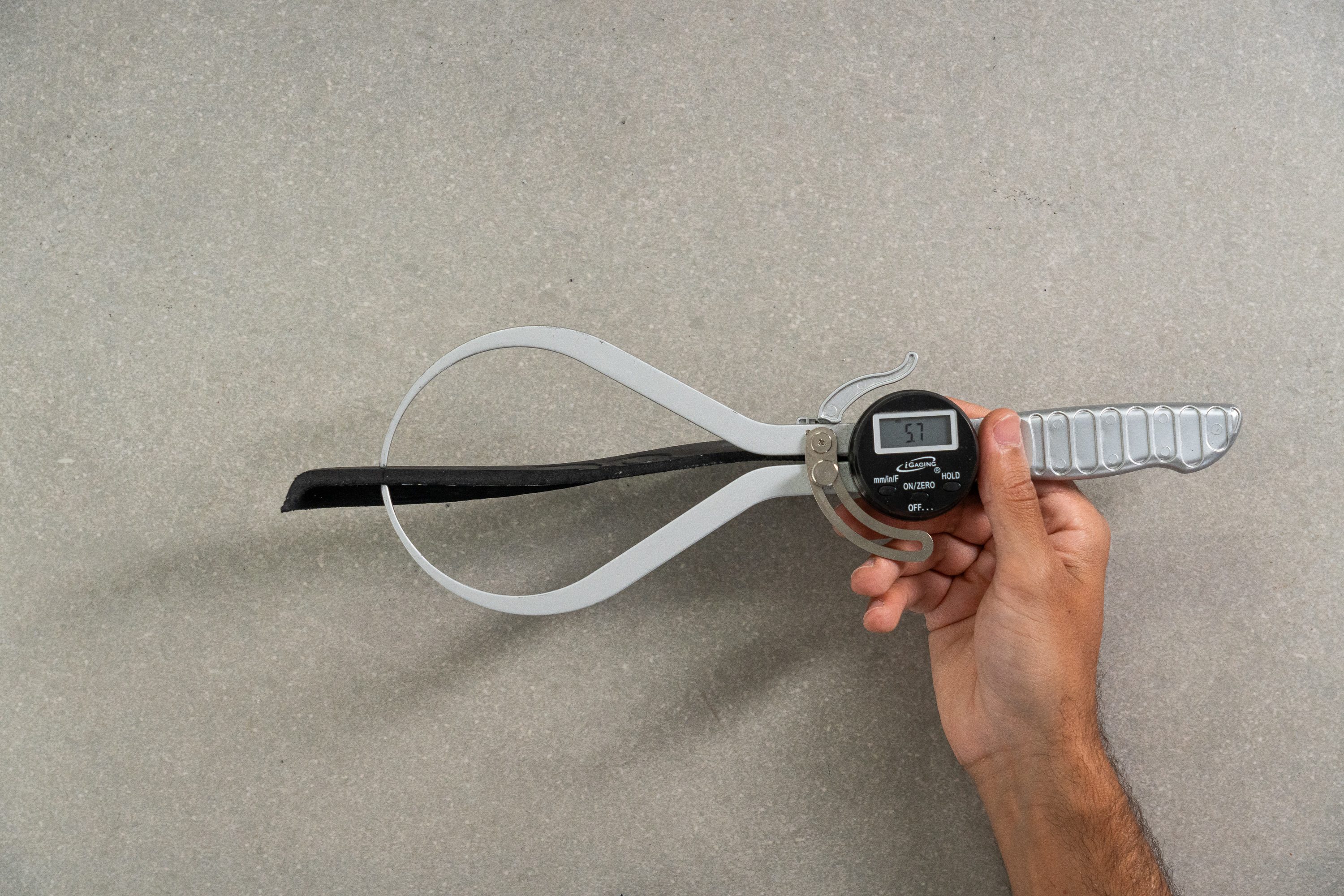
| Cloud X 3 | 5.7 mm |
| Average | 4.0 mm |
Removable insole
The shoe's insole is very easy to remove. It will be especially beneficial for those who wish to add more plushness underfoot.
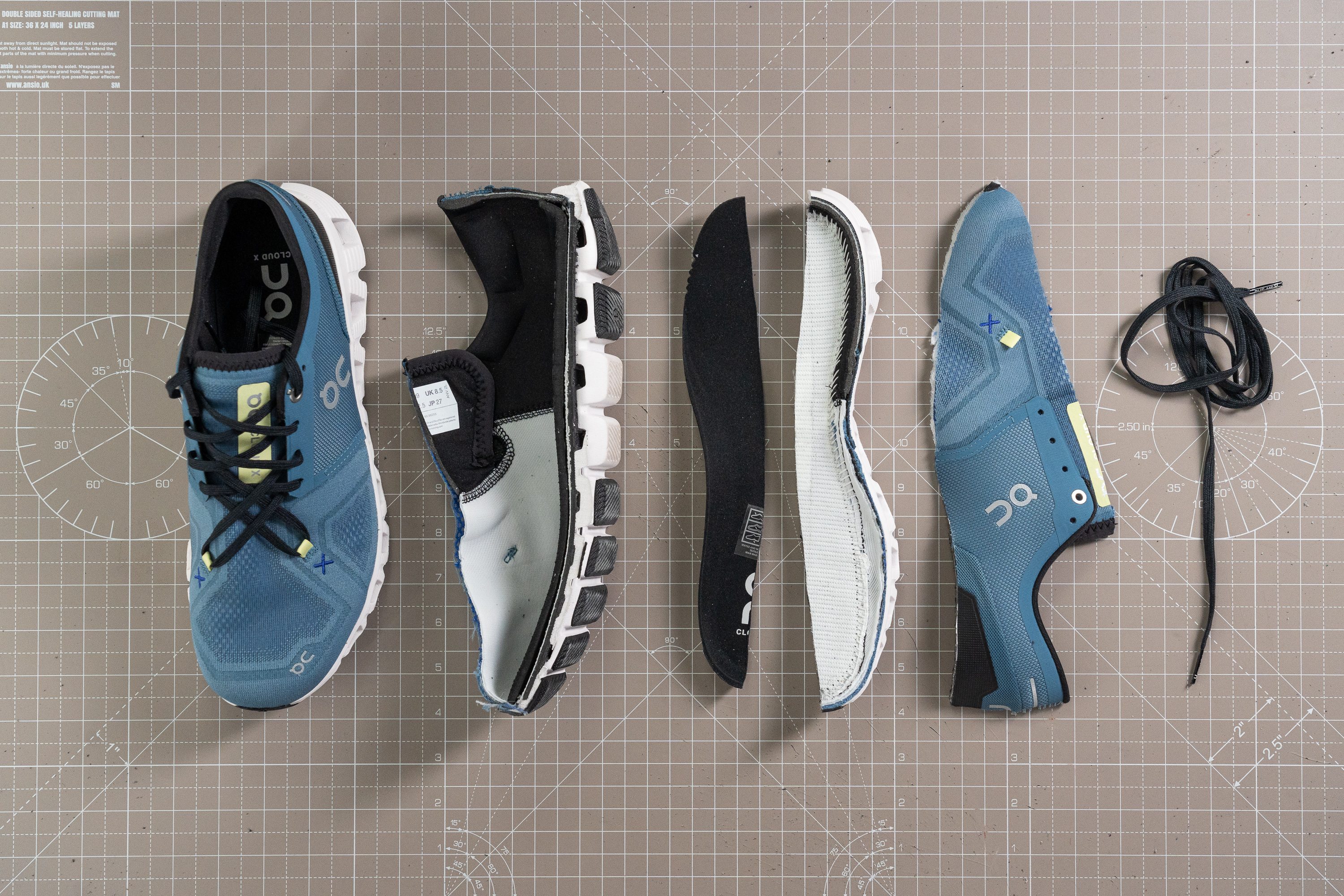
| Cloud X 3 | Yes |
Reflective elements
The branding on the shoe's sides and heels is reflective and lights up in the dark.
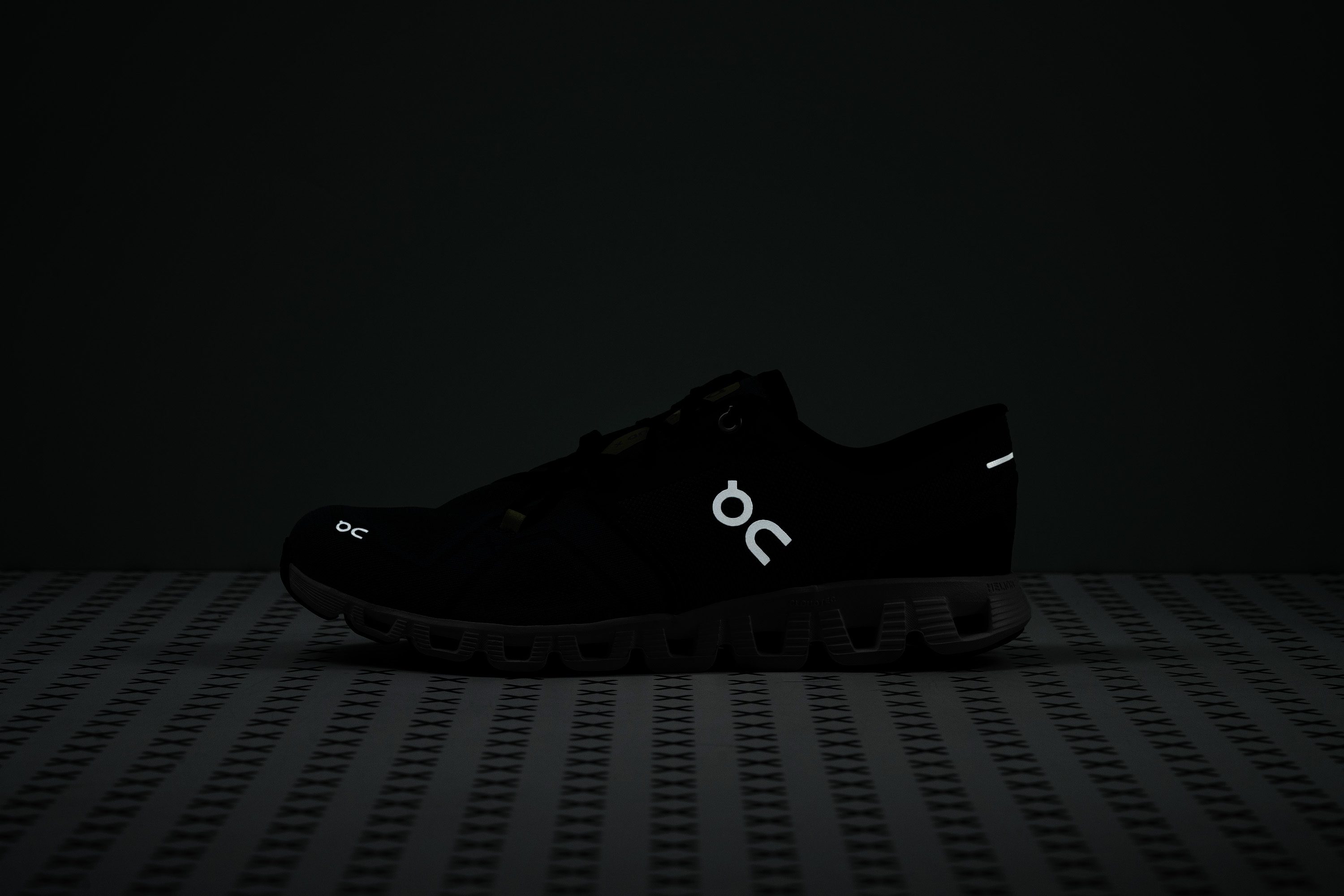
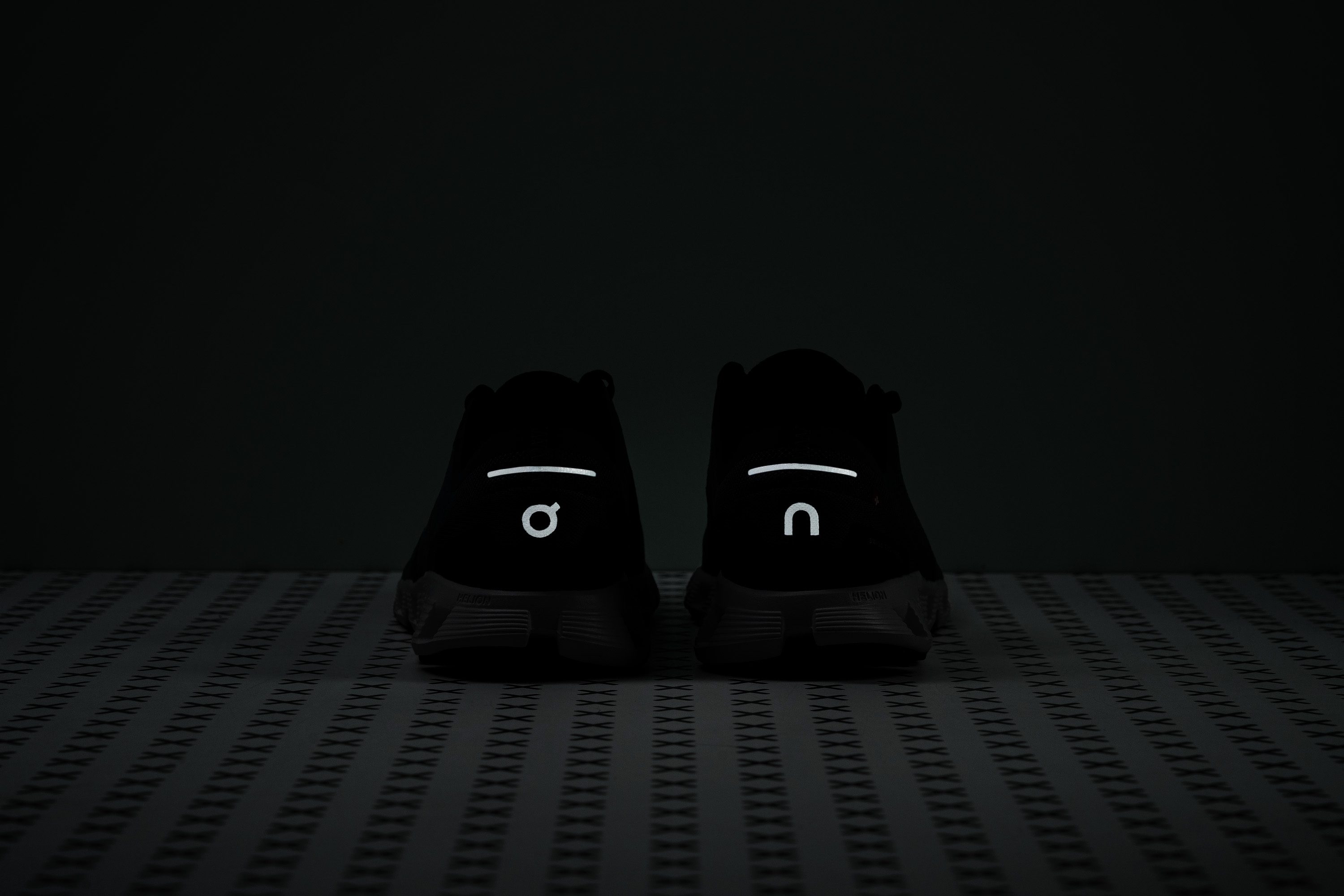
| Cloud X 3 | Yes |
Tongue padding
The tongue of the Cloud X 3 is not very thick compared to other trainers. We measured it at 4.4 mm whereas the average is 5.8 mm.
And yet, we never experienced any lace bites or pressure points.
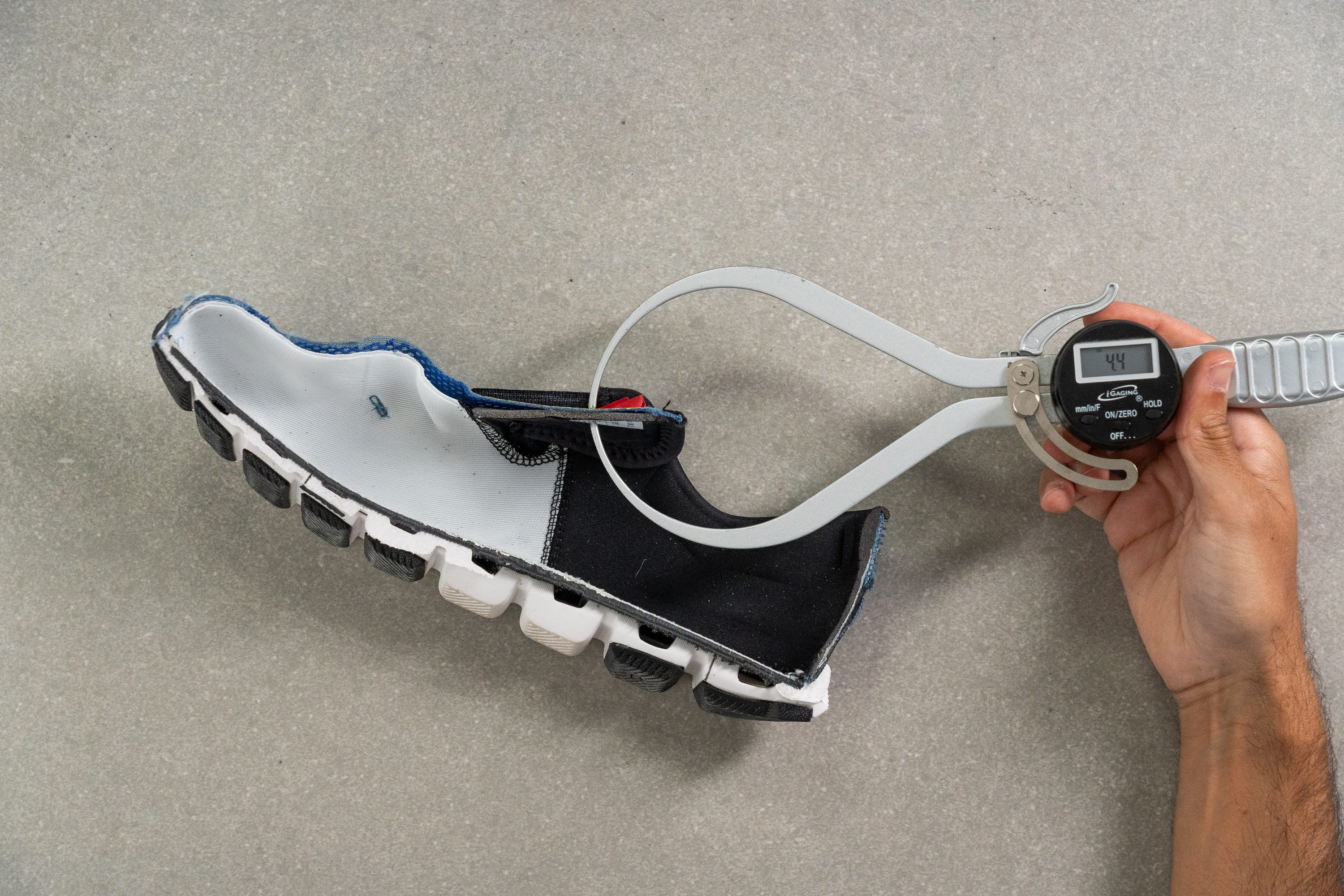
| Cloud X 3 | 4.4 mm |
| Average | 5.7 mm |
Heel tab
There is no pull tab on the Cloud X 3 but it is relatively easy to put on.
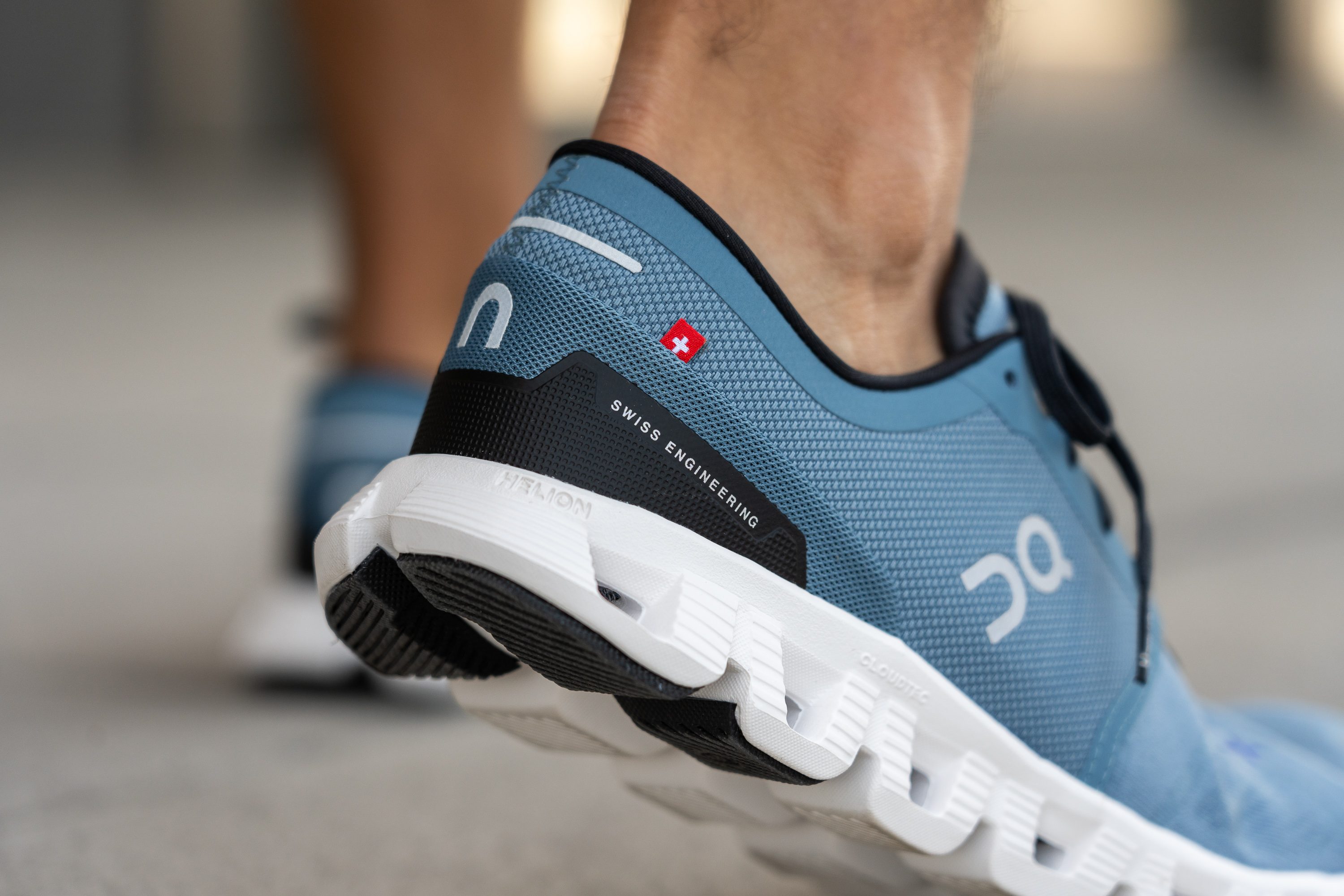
| Cloud X 3 | None |
Tongue: gusset type
We experienced no issues with the lockdown either. Perhaps in part because of the shoe's embedded tongue.
It is not fully separated from the rest of the upper as in most shoes. We felt like this really helped to create a sock-like fit.
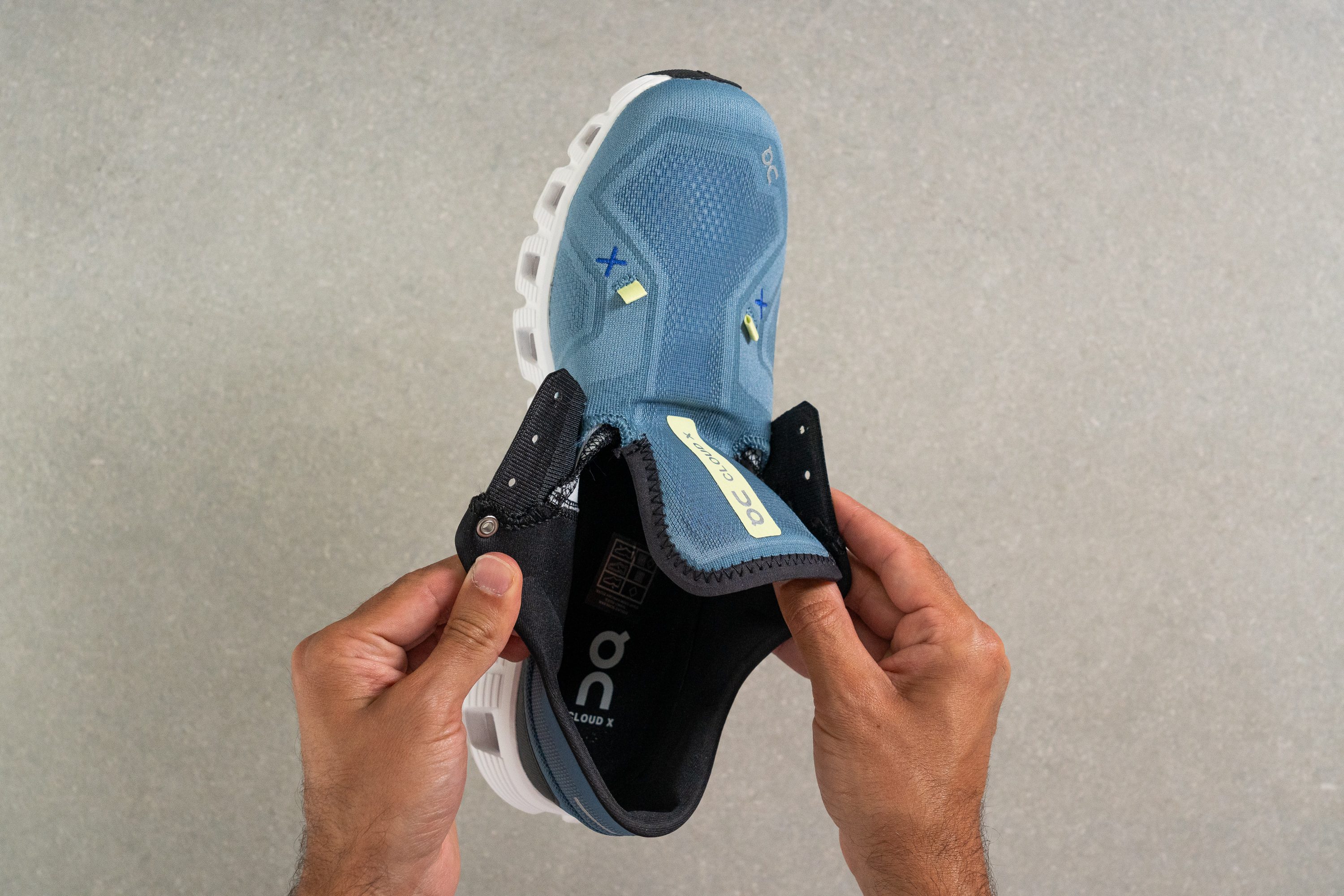
| Cloud X 3 | Both sides (full) |
Sustainable materials
A very welcome bonus for responsible buyers - 35% of the On Cloud X 3's materials are made up of recycled content.
